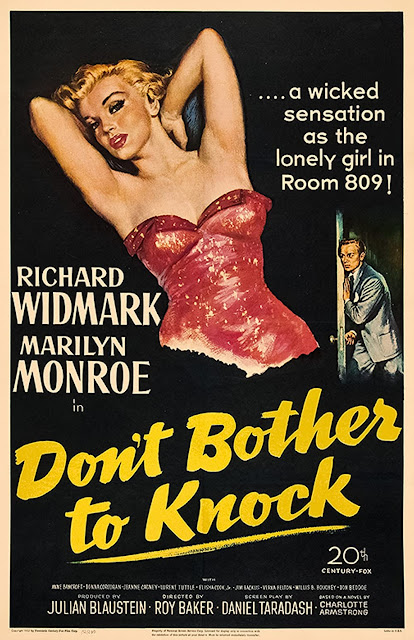Watched: 01/10/2023
Format: TCM
Viewing: First
Director: Roy Ward Baker
Huh. This was not at all what I was expecting.
Essentially a movie about post-war trauma, wrapped up in a taught 76 minute, thriller-like package, it's maybe more *real* than the well-rehearsed, twitter-friendly approaches to mental illness we'd see in a film now. It's a thriller without a villain, even though that doesn't feel like the set-up - and the movie absolutely has empathy in spades and as a reflection of a nation on the other side of the war, doesn't really have time for your finger-wagging.
Marilyn Monroe plays a woman new to New York City, whose uncle (Elijah Cook Jr.!) - an elevator operator in a hotel - has landed her a one-night job as a babysitter for a rich couple, the husband there to collect an award for his editorials. While they're at the ceremony, they'll have Monroe watch over their daughter.
Anne Bancroft (in one of her first roles) is the lounge singer in the hotel, and while she's tried to break up with her sometimes boyfriend in the shape of Richard Widmark playing a cocksure airline pilot, he's shown up at the hotel and is looking to ignore her plans for a split.
Bancroft is serious, tells him why he sux (he's made being a dick his whole personality) and shoos him away. He goes back to his room upstairs which looks across a courtyard into Monroe's room and calls over, mistaking her for a society dame.
But, uh-oh. Monroe is deeply unbalanced, delusional, and physically dangerous.
Look, Monroe is @#$%ing great here. I've not watched the various recent movies about Monroe, I don't know what they're telling people about her, but when she's on screen, all the superlatives fit. Apparently (according to Muller) she was very Monroe on set, but when Widmark saw the dailies, he was like, hey whatever her goofy process is, who cares. This works. And it does.
Released seven years after the war, you're in the period where people are still talking about it in shorthand. Monroe's character had something like a nervous breakdown when her beloved died en route to Hawaii carrying cargo during the war, and she tried to kill herself, ending up in a psych ward. Oh, and apparently her parents were religious zealots who made her life hell. An armchair diagnoses also suggests schizophrenia (I am not a licensed anything) as Monroe drifts between shifting versions of reality. Unfortunately, it also means she can be violent - aiming her aggression at anyone. And that can be little girls and uncles.
But the movie is about the compassion you still have to have for the raving lunatic in front of you. Even guys who maybe came out of the war inside a shell of cynicism and nihilism - and that's... no small thing. And maybe the message is more impactful because of the near-horrors of the movie and the rapidly escalating madness as Monroe goes wilder and wilder as her reality splinters.
Anyway, I appreciate the nearly play-like vibe as the movie takes place in near real-time over a single portion of an evening, the inversion of my expectations (I expected Widmark would stalk Monroe and the kid) and the deeply sincere ending of the film - and room for growth for Widmark's character. It's a deeply f'd up movie, and a sliver of what was happening as post-War trauma played out across the world for everyone in unpredictable and unfortunate ways. And when you can show people being unpleasant, sometimes you get at something.


No comments:
Post a Comment